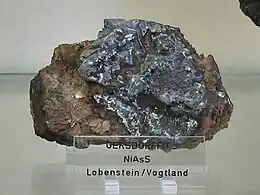Gersdorffite
Gersdorffite is a nickel arsenic sulfide mineral with formula NiAsS. It crystallizes in the isometric system showing diploidal symmetry. It occurs as euhedral to massive opaque, metallic grey-black to silver white forms. Gersdorffite belongs to a solid solution series with cobaltite, CoAsS. Antimony freely substitutes also leading to ullmannite, NiSbS. It has a Mohs hardness of 5.5 and a specific gravity of 5.9 to 6.33.
| Gersdorffite | |
|---|---|
 Gersdorffite | |
| General | |
| Category | Mineral |
| Formula (repeating unit) | NiAsS |
| Strunz classification | 2.EB.25 |
| Crystal system | P213 polytype: cubic Pa3 polytype: cubic Pca21 polytype: orthorhombic |
| Identification | |
| Color | silver white to steel gray |
| Mohs scale hardness | 5-5.5 |
| Streak | grayish black |
| Specific gravity | 5.6-6.2 |
Gersdorffite has three crystallisation forms: Gersdorffite-P213 (NiAsS), Gersdorffite-Pa3 (Ni(As,S)2) and Gersdorffite-Pca21 (NiAsS).[1] Gersdorffite occurs as a hydrothermal vein mineral along with other nickel sulfides. Associated minerals include nickeline, nickel-skutterudite, cobaltite, ullmannite, maucherite, löllingite, platinum-group minerals, millerite, pyrite, marcasite, and chalcopyrite.
Gersdorffite was first described in 1843 and named in 1845 for Johann von Gersdorff (1781–1849), owner of the nickel mine at Schladming, Austria the type locality.
References
- Bayliss P (1982) A further crystal structure refinement of gersdorffite, American Mineralogist 67, 1058-1064
- Palache, C., H. Berman, and C. Frondel (1944) Dana's system of mineralogy, (7th edition), v. I, pp. 298–300
- Webmineral data
- Mindat with location data
- Mineral Data Publishing PDF
- Schumann, Walter (1991). Mineralien aus aller Welt. BLV Bestimmungsbuch (2 ed.). p. 223. ISBN 978-3-405-14003-8.